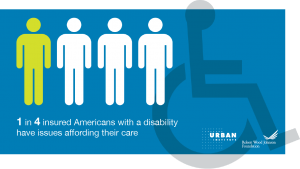 The Urban Institute and the Robert Wood Johnson Foundation have released a survey which looks at issues that individuals encounter when trying to access care even after they have obtained coverage. More importantly, the survey examines the increase in barriers to care when an individual has a disability. Some interesting stats from the survey are as follows:
The Urban Institute and the Robert Wood Johnson Foundation have released a survey which looks at issues that individuals encounter when trying to access care even after they have obtained coverage. More importantly, the survey examines the increase in barriers to care when an individual has a disability. Some interesting stats from the survey are as follows:
- 25% of Americans with a disability have issues affording their care or have a plan that denied payment for specific services. This is nearly double the amount of individuals without a disability (13.6%)
- 10.1% of Americans with a disability were unable to access care because the doctor and/or hospital would not accept their insurance which is over three times the amount of individuals without a disability (3.2%)
- 16.8% of Americans with a disability were unable to access care because they had trouble getting to and from their doctor appointments (compared to 9.2% of those without a disability)
- 12% of Americans with a disability could not schedule an appointment as soon as they needed (compared to 7.7% of those without a disability)
Some of these issues could be addressed during enrollment. Making sure an individual’s doctor, including specialists, are in the network can alleviate the issue of doctors not accepting insurance. The same could be said of checking prior to enrollment which doctors in network are accepting new patients and making sure that they are located in a place where the individual can get to them. Finally, as it relates to affording care, this emphasizes the need to really look at what the individual’s out-of-pocket costs will be with a plan and not just the amount of the monthly premium. Doing some of these steps during enrollment will not avoid all these issues but it could help in reducing the numbers.
Note: in all of the statistics above, the individuals had some type of insurance coverage but the simple fact of coverage wasn’t enough. To read the full analysis on the Urban Institutes website, click here.
